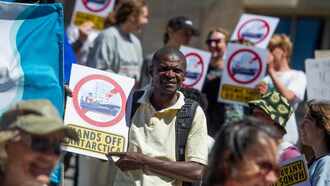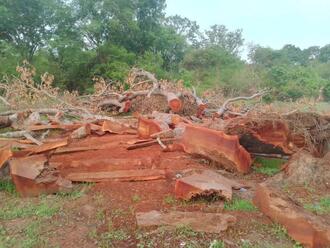-
Hands off AntarcticaKarpinsky uses seismic technology scientifically proven to disrupt the intrinsic behaviour of marine animals such as whales and dolphins. This can lead to hearing loss, organ rupture, and mass strandings. It also kills plankton, the basis of the food chain upon which all marine life depends. Beyond seismic blasting’s immediate harm to marine life lies an even more sinister threat. In February 2020, Russian state-owned company Rosgeo announced that the Karpinsky, during an expedition to the Antarctic continental shelf, discovered 70 billion tons (500 billion barrels) of potential oil and gas resources under the Southern Ocean. This is equivalent to 15 years of world oil consumption. There is no plausible reason for building this detailed hydrocarbon inventory other than that Russia hopes to begin producing these oil or gas resources at some point in the future. The International Energy Agency (IEA) has concluded that fossil fuel exploration must end if we remain below the 2°C limit and prevent catastrophic climate change. Climate change is the defining crisis of our time, and no region of the world can escape its devastating consequences. UN Secretary-General Antonio Guterres has called the continued exploitation of fossil fuels "moral and economic insanity". South Africa is one of 29 countries - and the only African country - with decision-making powers under the Antarctic Treaty System (“ATS”). As such, it is the only African country that can ensure that common sense prevails in the interests of Africa. Your support is highly appreciated, with thanks from Greenpeace Africa Cape Town volunteers, Green Connection, Oceans Not Oil and Extinction Rebellion #ProtectAntarctica #HandsOffAntarctica Sources: Letter of demand >>> https://drive.google.com/file/d/1MGAaYP2mEVLupCUR66z-1ELoOte3IYAJ/view?usp=sharing 2022 Government Gazette >>> https://www.gov.za/sites/default/files/gcis_document/202202/45903gon1751.pdf EWN >> https://ewn.co.za/2023/01/26/no-to-seismic-surveys-greenpeace-against-russian-polar-vessel-arrival IOL >> https://www.iol.co.za/capeargus/news/arrival-of-russian-seismic-research-ship-sparks-protest-in-cape-town-ddd3d9b8-f953-4c5e-90ec-df30bbc7e84a Image >> https://www.facebook.com/CapeArgus/?tn-str=k%2AF210 of 300 SignaturesCreated by Elaine Mills
-
Ban All Seismic Survey On SA Coastlines- We urge fellow South Africans to unite, help us protect and call on a permanent "BAN" of all seismic explorations on South Africa's coastline. Stop Minister Mantashe and the oil & gas giants from trapping South Africa in the future of harmful non-progressive fossil fuels. - It is a big concern that some areas targeted as blasting spots are among the most extensive, pristine marine environment in South African waters, and include significant and diverse marine habitats that protect endangered species (Coelacanths, Natal shy sharks, African penguin) and are essential environmental services. - The promise of job creation is a fairytale, there are no jobs, and the available jobs are for highly skilled rig operators and workers. - Small-scale fishers whose livelihoods depend on the oceans will be left without their means to make a living. - We need to break free from harmful oil and gas dependency and speed up a just transition to renewable energy. Renewable sources are cost-effective and safe for the environment. - Studies have shown that renewable energy can create about 231 400 jobs up to 2030, which beats the current 120,000 jobs the fossil fuels industry provides for South Africans. Sources: - Photo: David McNew/Getty Images - Mail & Guardian Article >>> https://mg.co.za/opinion/2021-09-01-renewable-energy-can-create-about-231-400-jobs-up-to-2030/ - amaBhungane Article >>>> https://amabhungane.org/stories/220528-the-case-for-gas-is-evaporating/ - Meridian Economics Report >>>> https://meridianeconomics.co.za/our-publications/hot-air-about-gas-an-economic-analysis-of-the-scope-and-role-for-gas-fired-power-generation-in-south-africa/ - Datafree Article >>> https://slrpublicdocs.datafree.co/en/public-documents/TEEPSA-567 - Petroleum Agency SA >>>> https://www.petroleumagencysa.com/index.php/maps125 of 200 SignaturesCreated by Greenpeace Africa SA volunteers
-
SOS Casamance: Forêts et biodiversité en danger !- Les reserves de forêts classées sont menacées par la coupe abusive et illégale de bois - L'habitat naturelle de certains espèces est menacé (on ne trouve plus comme avant des hippopotames, des crocodiles et des biches) - La perte d'espaces forestières nous expose au changement climatique - La biodiversité est menacée - L'identité et l'héritage culturel des peuples de la forêt sont menacés16 of 100 SignaturesCreated by Cheikh Bamba Ndao



